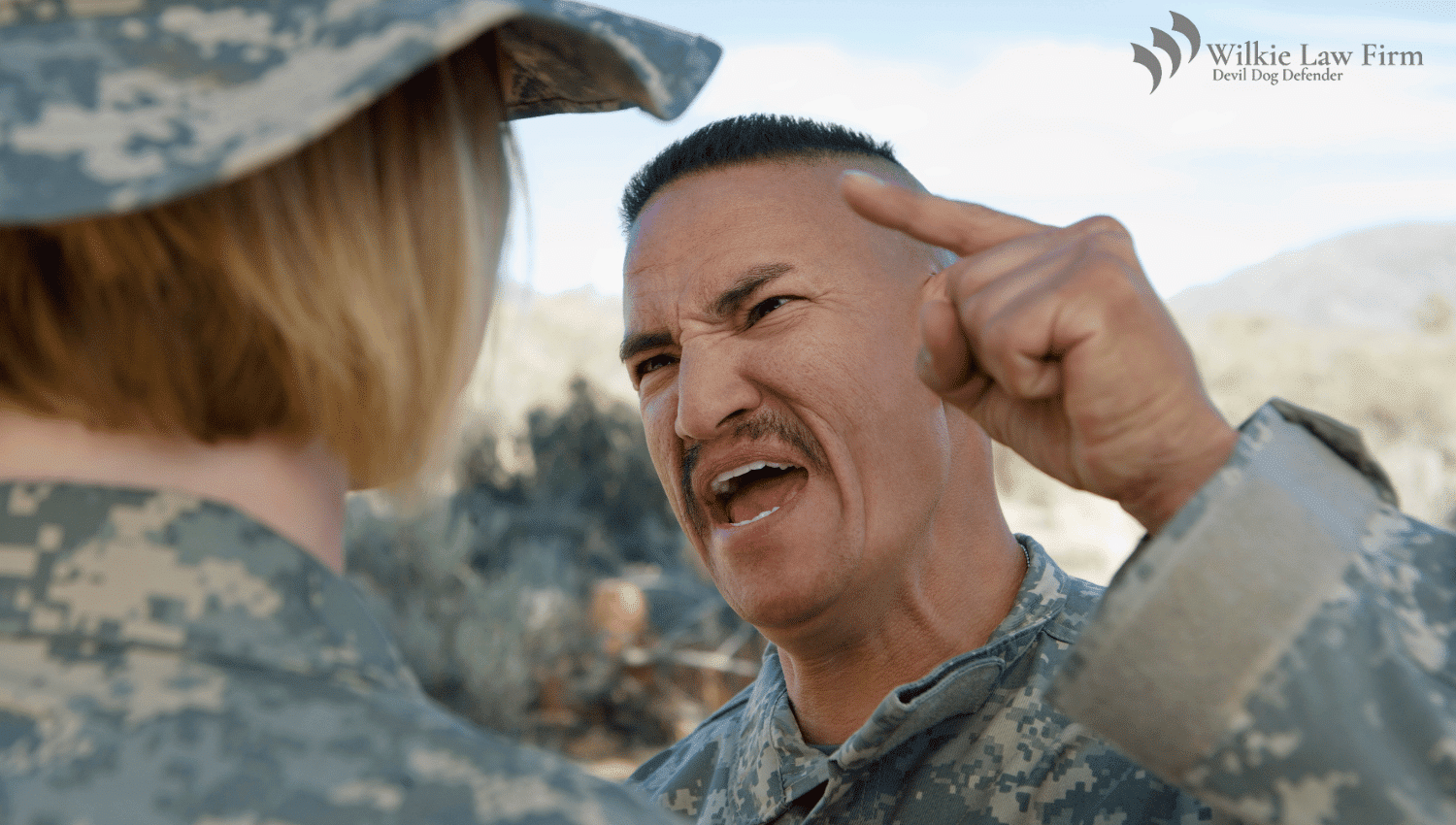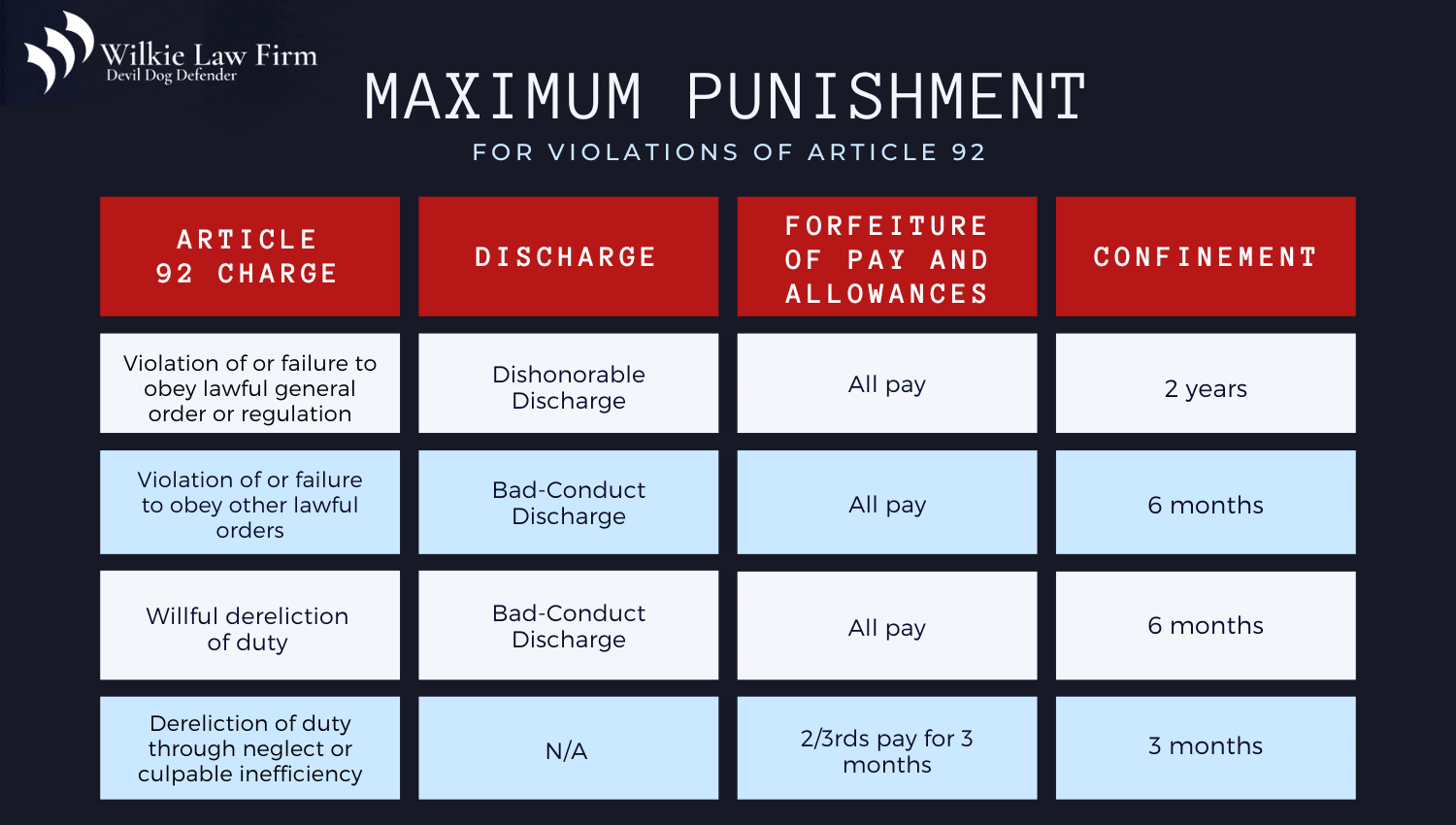UCMJ Article 92
Military Defense Attorney for Article 92 Violations
Home » Article 92 UCMJ – Failure to Obey an Order
Military Counsel
UCMJ Articles
Article 92 UCMJ - Failure to Obey an Order
Table of Contents
Members of the armed forces are governed by a completely different code of laws than civilians. These laws can be found in what is called the Uniform Code of Military Justice, or the UCMJ Articles. There are hundreds of articles within the code, each covering a different violation of military law. Here, our experienced North Carolina military defense attorney at the The Wilkie Law Group will cover UCMJ Article 92, which refers to the failure to obey an order or regulation.
What is UCMJ Article 92?
Article 92 of the UCMJ is a common violation, as it covers a broad range of actions. There are three main elements that make up a failure to obey order or regulation charge. A service member who is found to be in violation of this Article must meet one of the three requirements. These include:
- Any person who violates or fails to obey any lawful general order or regulation;
- Having knowledge of any other lawful order issued by a member of the armed forces, which it is his or her duty to obey the order; or
- Is derelict in the performance of his or her duties.
Breakdown of Article 92 of the UCMJ
Below, we’ll break down the elements for each distinct violation of UCMJ Article 92, including the failure to obey a general lawful order or regulation, the failure to obey another direct lawful order, and either willfulness or neglect/culpable inefficiency resulting in the dereliction of the performance of duties.

1. Violation of or failure to obey a lawful general order or regulation.
a) That there was in effect a certain lawful general order or regulation;
b) That the accused had a duty to obey it; and
c) That the accused violated or failed to obey the order or regulation.
EXPLANATION
Authority to issue general orders and regulations. General orders or regulations are published by the President or Secretary of Defense, of Homeland Security, or of a military department and issued by:
(i) office with general court-martial jurisdiction;
(ii) general or flag officer in command; or
(iii) a commander superior to (i) or (ii).
Effect of change of command on validity of order. A general order or regulation retains its authority until it expires or is rescinded by separate action.
Lawfulness. A general order of regulation is lawful unless it is contrary to the Constitution, the laws of the U.S., or lawful superior orders.
Knowledge. Knowledge need not be alleged or proved, as knowledge is not an element of this offense and a lack of knowledge does not constitute a defense.
Enforceability. Regulations which only supply general guidelines or advice for performing military functions may not be enforceable.
Punitive Language. A general order must have the requisite punitive language to put a party on notice that disobedience of the order could result in punitive or adverse administrative action. Absence of such language could be a fatal defect of said order.
2. Failure to obey other lawful order.
a) That a member of the armed forces issued a certain lawful order;
b) That the accused had knowledge of the direct order; and
c) That the accused had a duty to obey the order; and
d) That the accused failed to obey the order.
EXPLANATION
Scope. All other lawful orders, including written regulations (which are not general regulations).
Knowledge. In order to be guilty of this offense, a service member must have had actual knowledge of the order or regulation, which may be proved by circumstantial evidence.
Duty to obey an order. From a superior and from one not a superior, such as an order issued by a warrant, noncommissioned, or petty officer in the execution of office.
3. Dereliction in the performance of duties.
a) That the accused had certain duties;
b) That the accused knew or reasonably should have known of the duties; and
c) That the accused was willfully or through neglect or culpable inefficiency derelict in the performance of those duties.
[Note: In cases where the dereliction of duty resulted in death or grievous bodily harm, add the following element as applicable.]
d) That such dereliction of duty resulted in death or grievous bodily harm to a person other than the accused.
EXPLANATION
Duty. A duty may be imposed by treaty, statute, regulation, lawful order, standard operating procedure, or custom of the Service.
Actual Knowledge. The actual knowledge of duties may be proved by circumstantial evidence if the individual reasonably should have known of the duties. This may be demonstrated by regulations, training or operating manuals, or testimony of persons who have held similar or superior positions with similar evidence.
Derelict. When a person willfully or negligently fails to perform or performs duties in a culpably inefficient manner.
- Willfully means intentionally (performing an act knowingly and purposely). The service member must be specifically intending the natural and probable consequence of the act.
- Negligently means an act or omission of a person to use due care which a reasonably prudent person would have exercised under the same or similar circumstances.
- Culpable inefficiency is inefficiency for which there is no reasonable or just excuse.
Ineptitude. A person is not derelict if the failure to perform is caused by ineptitude rather than by willfulness, negligence, or culpable inefficiency and may not be charged under this article or otherwise punished.
Grievous Bodily Harm. Includes bodily injury that involves a substantial risk of death, extreme physical pain, protracted and obvious disfigurement or protracted loss or impairment of the function of a bodily member, organ, or mental facility.
UCMJ Article 92 Punishment
If you are found guilty of violating Article 92, failure to obey an order, you face some serious consequences at the hands of the military justice system. The degree of the punishments depends on the type of violation.
- For the violation of or failure to obey a lawful order or regulation, the maximum punishment for service members is 2 years confinement, the forfeiture of all pay and allowances, and a dishonorable discharge.
- If a service member is found guilty of the violation of or failure to obey other lawful orders, they face up to 6 months confinement, the forfeiture of all pay and allowances, and a bad-conduct discharge.
- Those who are found to be willfully derelict of duty face a maximum punishment of a bad-conduct discharge, forfeiture of all pay and allowances, and up to 6 months confinement.
- For the dereliction of duty resulting from neglect or culpable inefficiency, the defendant faces up to 3 months of confinement and the forfeiture of two-thirds pay for 3 months.

Defense of a UCMJ Article 92 Violation
Article 92 of the Uniformed Code of Military Justice states that a lack of knowledge of the regulation does not constitute a defense. Therefore, the focus will be on the flaws in the regulation, as well as verification that the specific order or regulation applies to the accused service member. Regulations for general guidelines or advice may not be enforceable and exceptions could be relevant. Failure to specify the order or regulation, missing a designation of general order, or failure to state that the regulation is punitive should all be investigated. The regulation must also specifically prohibit the alleged conduct.
One of the key elements regarding the duty to obey lawful orders is knowledge of the order itself. This can be given regardless of rank if it is issued in the execution of office (i.e. warrant). The specificity of the order and verification that it has been given can be called into question. Prohibiting personal activities with the intent to safeguard or promote the morale, discipline, and usefulness of a unit is allowed with a valid military purpose. However, even orders that are necessary to accomplish a military mission can be overextended and begin to limit personal rights for service members.
For the willful dereliction of duty element to occur, the service member must first have knowledge of the particular duty, which can be demonstrated by training or manuals. The article states that the accused is not derelict if the failure to obey order or regulation is caused by ineptitude rather than by willfulness, negligence, or culpable inefficiency.
The ability of the accused and the context of the performance of the duty are all relevant in these cases. An experienced military defense attorney can look into each of these aspects, as well as many others, to determine the best defense for a service member’s case.
Article 92 UCMJ Counseling
If you are facing charges due to an Article 92 (failure to obey lawful order) violation, do not take it lightly. You risk losing benefits, status, pay and allowances, and so much more. You need to equip yourself with an attorney as soon as possible to ensure your charges are fought aggressively from the very beginning.
In order to prove beyond a reasonable doubt that you were in violation of UCMJ Article 92, the prosecution must present competent evidence that meets at least one of the key elements for disobeying a lawful order. A good military defense attorney with expansive knowledge, skills, and experience defending service members in these types of cases can fight the allegations against you and achieve the best possible outcome on your behalf.
Military Defense Attorney for Article 92 Violation
Military members have a lot to lose when they face a conviction for the failure to obey an order or regulation (Article 92 of the UCMJ). They need someone in their corner who knows the military legal code and whose only concern is fighting as hard as possible for them. While they may be free, a military-appointed JAG attorney may face undue influence from a superior military chain of command. This means they often must consider their own concerns and interests before their clients. Civilian defense lawyers, as opposed to military-appointed attorneys, are able to work with the freedom of legal maneuver and with no threat to their own rank or position.
Whether you’re under investigation or pending courts-martial, never underestimate the power of a qualified civilian defense attorney like Aden Wilkie of the The Wilkie Law Group. In addition to curating a solid legal defense and protecting your rights and future, Aden can also provide superior military discharge upgrade counsel. Located in Jacksonville, NC, Aden Wilkie services armed forces at Camp Lejeune and Fort Bragg as well as other bases, camps, stations, and posts across the nation.
Please keep in mind that this article is for general information purposes. Once an attorney-client relationship is established, you will be able to learn more about your legal options regarding your unique case. Call 910-333-9626 today for a consultation or complete our online intake form to learn more.
Contact an Article 92 Counseling Attorney
It is vital to use the knowledge of a seasoned attorney to organize and prioritize the material to present to the command. Call The Wilkie Law Group at 910-333-9626 to arrange your consultation.
